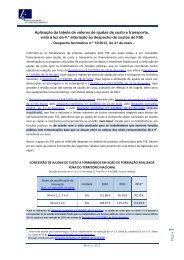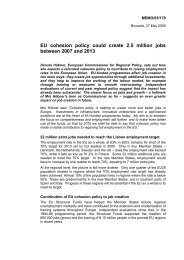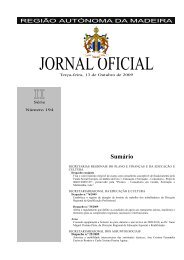Industrial Relations in Europe 2012 - European Commission - Europa
Industrial Relations in Europe 2012 - European Commission - Europa
Industrial Relations in Europe 2012 - European Commission - Europa
You also want an ePaper? Increase the reach of your titles
YUMPU automatically turns print PDFs into web optimized ePapers that Google loves.
<strong>in</strong>creased rapidly <strong>in</strong> connection with the expansion of the welfare state, and soon exceeded the<br />
workforce employed <strong>in</strong> the traditional functions of the state (Treu 1987). As a consequence, <strong>in</strong><br />
several countries where collective barga<strong>in</strong><strong>in</strong>g was previously banned, the right to barga<strong>in</strong> started to<br />
be recognised for various groups of public employees, although at times with a number of<br />
limitations.<br />
Further challenges to this separate regulation came <strong>in</strong> connection with the bureaucratic reform<br />
agenda pursued <strong>in</strong> many countries <strong>in</strong> the 1980s hand 1990s, often along the guidel<strong>in</strong>es of the New<br />
Public Management (NPM) doctr<strong>in</strong>e. NPM aimed to remove any difference between the public and<br />
the private sector as a way of <strong>in</strong>creas<strong>in</strong>g the efficiency and effectiveness of public services (OECD<br />
1995; Hood 1991 and 1995; Bordogna 2008; Peders<strong>in</strong>i 2009; Pollitt and Bouckaert 2011; Pollitt<br />
2011). Beside the UK, moves <strong>in</strong> this direction have taken place <strong>in</strong> several cont<strong>in</strong>ental <strong>Europe</strong>an<br />
countries, such as Italy and the Nordic countries. Italy, for example, used to share the legalistic<br />
adm<strong>in</strong>istrative tradition of France and of German Beamte, with a separate system of employment<br />
regulation and the unilateral determ<strong>in</strong>ation of pay and work<strong>in</strong>g conditions. However, after a partial<br />
change <strong>in</strong> 1983, Italy went through a major reform <strong>in</strong> 1992-1993, re<strong>in</strong>forced <strong>in</strong> 1997-1998. The<br />
employment relationship of more than 80% of Italian public employees was privatised and<br />
contractualised, <strong>in</strong>clud<strong>in</strong>g for managers (and top level managers s<strong>in</strong>ce 1998). Collective barga<strong>in</strong><strong>in</strong>g<br />
became the ma<strong>in</strong> method of regulat<strong>in</strong>g terms and conditions of employment, and the exclusive<br />
method with regard to pay, possibly supplemented by <strong>in</strong>dividual negotiations for top managers.<br />
Jurisdiction shifted from adm<strong>in</strong>istrative law and courts to the civil code and ord<strong>in</strong>ary tribunals,<br />
reduc<strong>in</strong>g the scope of the special prerogatives enjoyed by public employees <strong>in</strong> relation to the private<br />
sector workforce. The traditional career-based system for managerial staff was also partially<br />
amended, allow<strong>in</strong>g the recruitment of a certa<strong>in</strong> proportion of personnel on a contractual basis from<br />
outside the public adm<strong>in</strong>istration (Bordogna and Neri 2011).<br />
Similar developments have taken place <strong>in</strong> the Nordic countries, with reductions <strong>in</strong> special statutory<br />
employment protection for civil servants and the determ<strong>in</strong>ation of parts or all of their terms and<br />
conditions of employment via collective negotiations at central and local level (Ibsen et al. 2011).<br />
In the Netherlands as well, a shift from unilateral regulation of terms and conditions of employment<br />
on the part of the government (M<strong>in</strong>ister of the Interior) towards collective negotiations at sectoral<br />
level took place s<strong>in</strong>ce 1993, mean<strong>in</strong>g that that central government can no longer unilaterally change<br />
exist<strong>in</strong>g conditions (Steijn & Leis<strong>in</strong>k, 2007).<br />
However, despite several <strong>in</strong>stitutional and policy changes implemented over the past three decades,<br />
along the above-mentioned guidel<strong>in</strong>es, it is generally recognised that the “set of rules that govern<br />
pay and work<strong>in</strong>g conditions still differ significantly across private and public sectors <strong>in</strong> most EU<br />
countries”, as recently stressed by a ECB work<strong>in</strong>g paper (Giordano et al. 2011: 7). Other<br />
comparative studies confirm this feature, stress<strong>in</strong>g that the NPM-<strong>in</strong>spired reforms were less<br />
widespread than expected (Pollitt et al. 2007; Goldf<strong>in</strong>ch and Wallis 2010; Pollitt and Bouckaert<br />
2011; Pollitt 2011), and have had differentiated effects on public service employment relations<br />
(Bordogna 2008; Bach and Bordogna 2011). In particular, <strong>in</strong> several countries the special status of<br />
employment has not been abolished for large sections, or even the totality of public employees. The<br />
clearest examples <strong>in</strong> po<strong>in</strong>t are Germany and France. In Germany, civil servants, or Beamte, to<br />
whom the right to strike and the right to collective barga<strong>in</strong><strong>in</strong>g are denied, still make up around 38-<br />
40% of total public employees, unevenly distributed <strong>in</strong> all the three levels of government – federal,<br />
state and municipal, with a greater density at the first two levels (Keller 2011; EPSU 2008). This<br />
group is still governed by public law, with a special service and loyalty relationship with the<br />
adm<strong>in</strong>istration. Career public servants are appo<strong>in</strong>ted with, <strong>in</strong> pr<strong>in</strong>ciple, permanent tenure, not hired<br />
on a contractual basis. Their status is clearly separated from the group of white- and blue-collar<br />
133

















